Art Fairs
TEFAF Maastricht Bounces Back From Last Year’s Heist With an Encyclopedic Array of Precious Art and Strong Museum Interest
The Dutch art fair is back to its normal self—mostly.
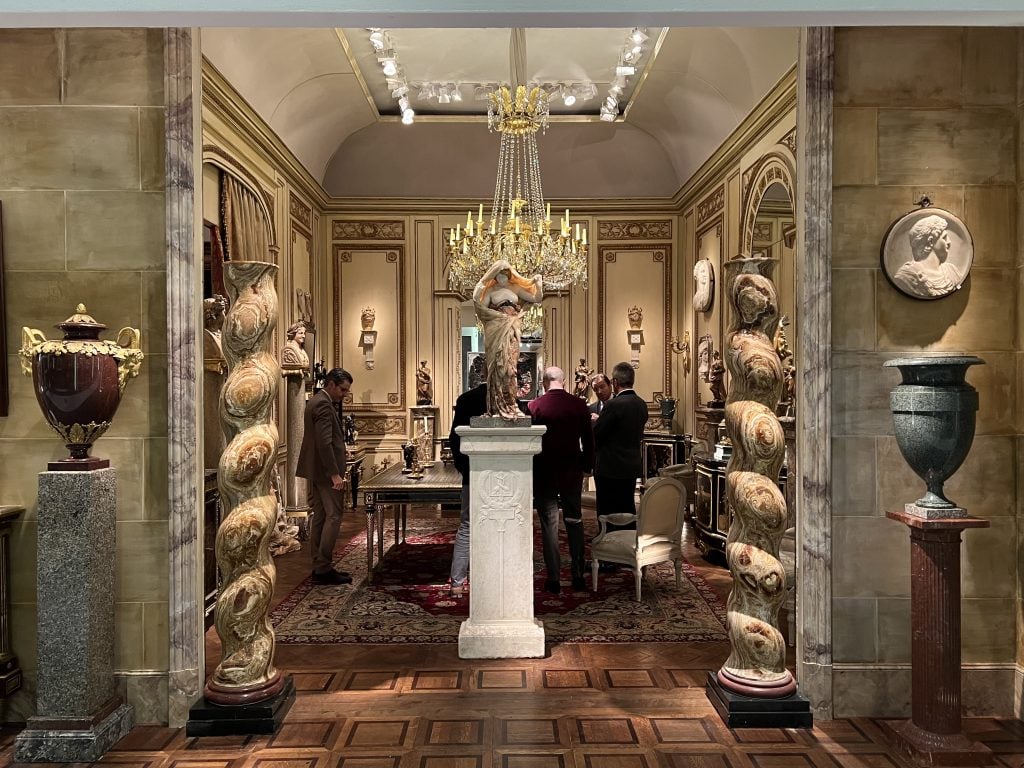
The Dutch art fair is back to its normal self—mostly.

Sarah Cascone

A massive cloud of baby’s breath and pink roses cascaded down from the ceiling, greeting visitors to the first preview day for the Dutch fair TEFAF Maastricht.
The ethereal display, an annual feature of the fair by the designer Tom Postma, was the first of a wide-ranging selection of visual delights at the Dutch fair. This year, some 270 international dealers brought the best of antiques, Old Masters, jewelry, 20th-century design, tribal art, and Modern and contemporary art, in a display that feels at times more like an encyclopedic museum than a commercial fair.
The obvious exception was a fleet of young women donning elaborate oyster-shaped fascinators while they poured champagne refills and served various types of raw seafood. (When they lined up for an official photo near the end of the first day, it prompted a number of gaping older male visitors to snap photos—a female dealer remarked that “this is so wrong.”)
The landscape for the fair has changed significantly since 2019, the last time it was able to stage its full event during its traditional March dates. In 2020, the burgeoning COVID-19 pandemic forced the fair, since acknowledged as a superspreader event, to close early.
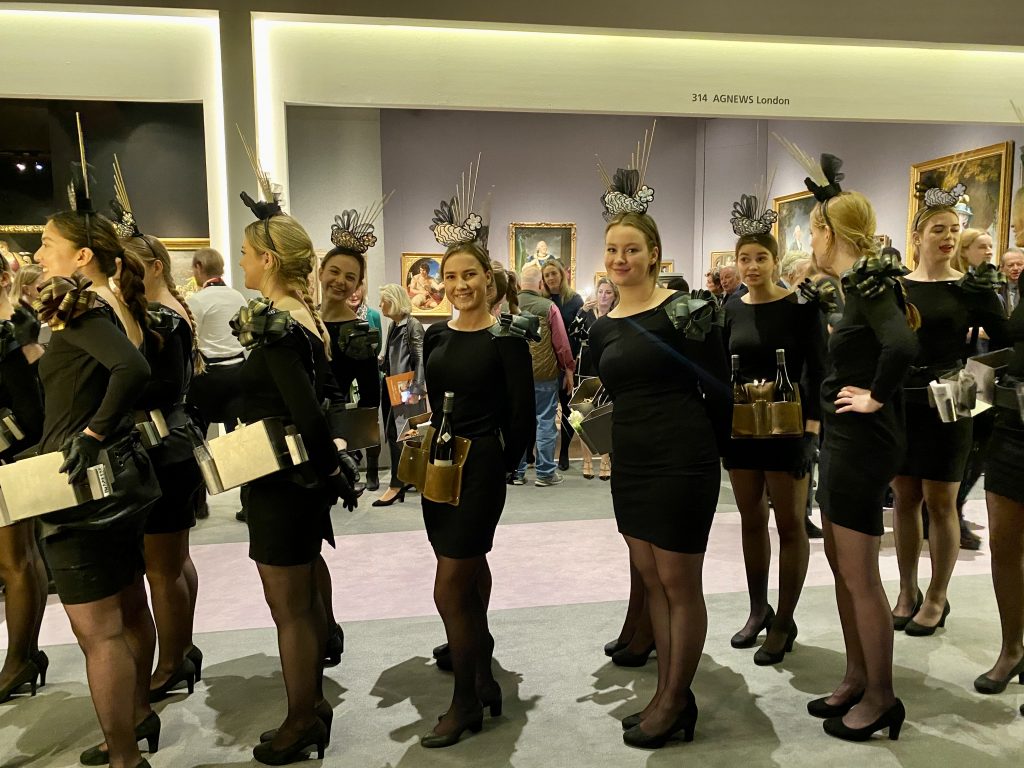
Serving team at TEFAF Maastricht. Photo by Sarah Cascone.
The 2021 edition was an online-only affair, and last year’s fair—which suffered an armed robbery reportedly at the hands of the Pink Panther Gang—was postponed until June. The fair has beefed up its security in the wake of the incident, adding metal detectors to the entrance.
The broad consensus among dealers appeared to be that that the move back to March was a good thing.
“It’s better than it was in June—the summer fair was not as good. Most of our American clients didn’t come because they were on holiday,” Sabine Mühlbauer of Germany gallery Kunsthandel Peter Mühlbauer told Artnet News.
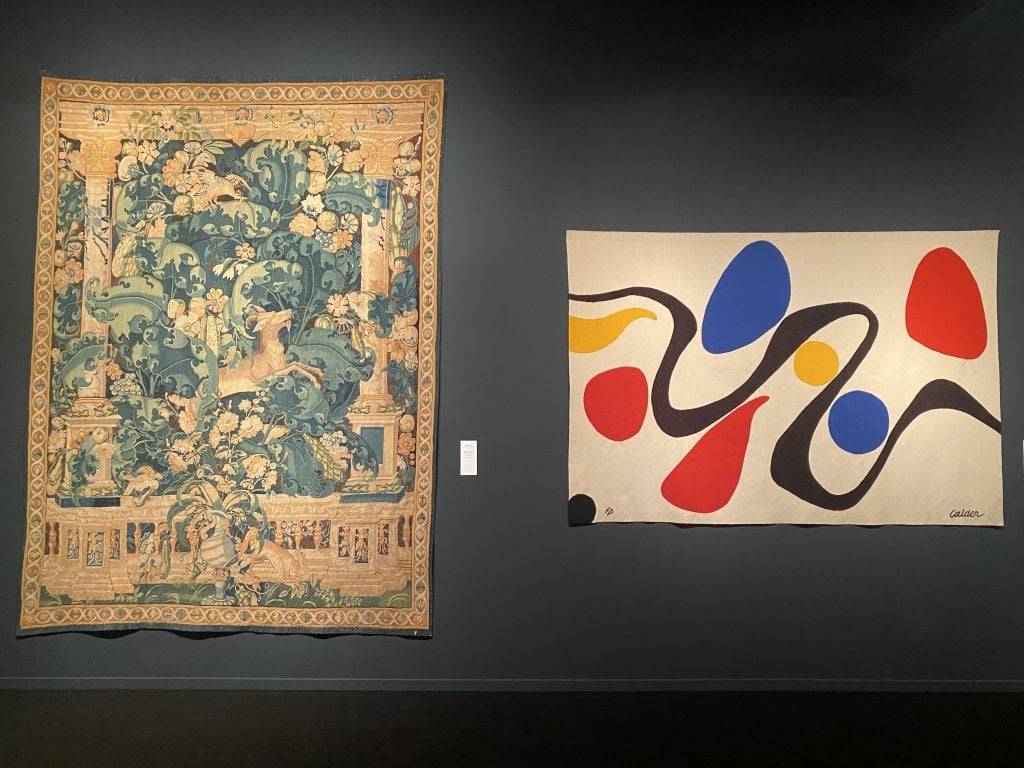
A 16th-century Dutch tapestry and an Alexander Calder tapestry from De Wit Fine Tapestries in Mechelen, Belgium, at TEFAF Maastricht. Photo by Sarah Cascone.
Over the last three years, the world has been rocked by a recession. But now, TEFAF is basically back to full strength, nearly matching its pre-pandemic 285 dealer count.
The art market has also been forced to reassess its ethical standards, with increased scrutiny on the provenance of antiquities in particular, as well as growing calls for the restitution of items acquired by Western collections in colonial times. (Every work offered at the fair is vetted by experts to ensure authenticity and that a sale is legal, but ethical issues are somewhat outside the scope.)
Dealers aren’t always eager to discuss such knotty and complex issues; Paris’s Yann Ferrandin, whose booth is in the tribal art section, refused outright to comment on the matter, insisting that restitution is only interesting to journalists.
Despite these challenges, TEFAF remains an impressively diverse fair where an Alexander Calder tapestry hangs next to a 16th-century Dutch example of the form (both from De Wit Fine Tapestries in Mechelen, Belgium); where you can choose from an Ai Weiwei LEGO mosaic (at Lisson Gallery, London and New York), and an 18th-century Iranian gold-overlaid steel Safavid helmet (from Amir Mohtashemi, London).
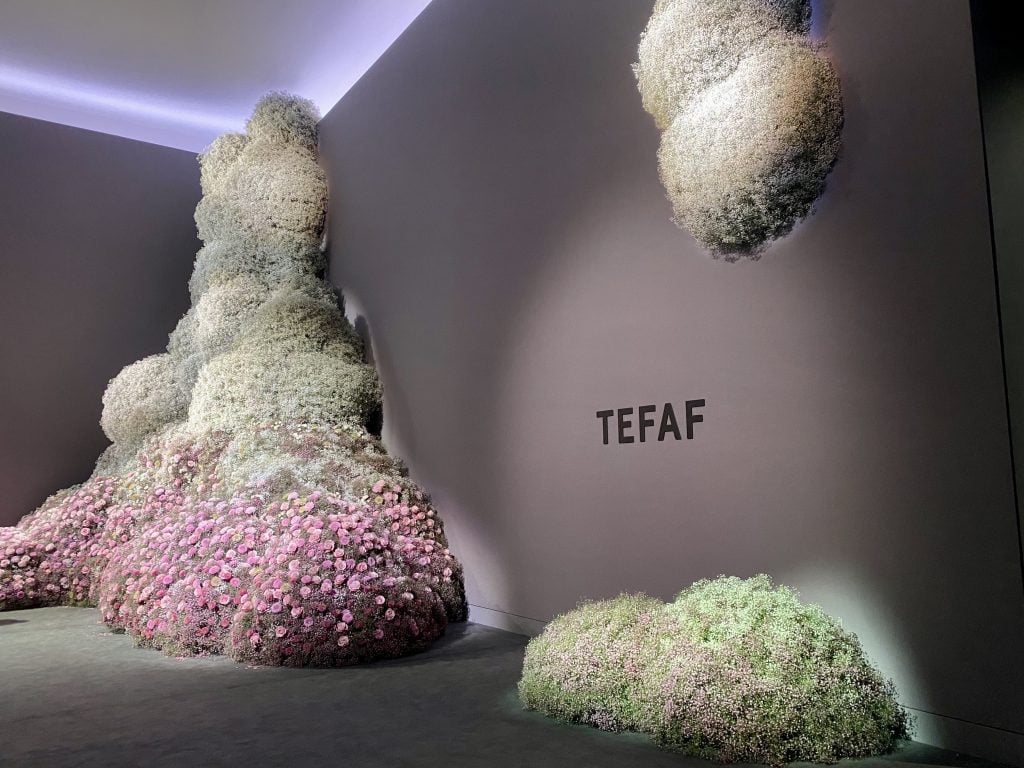
TEFAF Maastricht. Photo by Sarah Cascone.
These treasures are often shown in elaborately constructed booths that will make you question the dominance of the white cube. One notable highlight was the drawing room-style display from Paris’s Galerie Steinitz, which featured inlaid wooden floors and elaborate wall panels as a stunning backdrop for a selection of sculptures, furniture, and artworks from the 16th to the 19th centuries.
“Everything is for sale—my wife too, myself. It all depends on the price. I’m cheaper, obviously,” dealer Benjamin Steinitz, who first showed at TEFAF when his parents were running the family business, joked to Artnet News.
On day one of the fair, the gallery had already sold an 18th-century desk designed by Jean-Francois Leleu with ebony veneers and a leather top for around €2 million ($2.1 million). Steinitz believes it was originally from the collection of Joseph Fouché, Napoleon’s minister of police.
Tracking down rare pieces like this is only half the challenge for Steinitz. He admitted he can never really afford to purchase the significant and important work that he deals in—but he makes it happen anyway.
“If you have a piece of history like this, you should buy it,” he said.
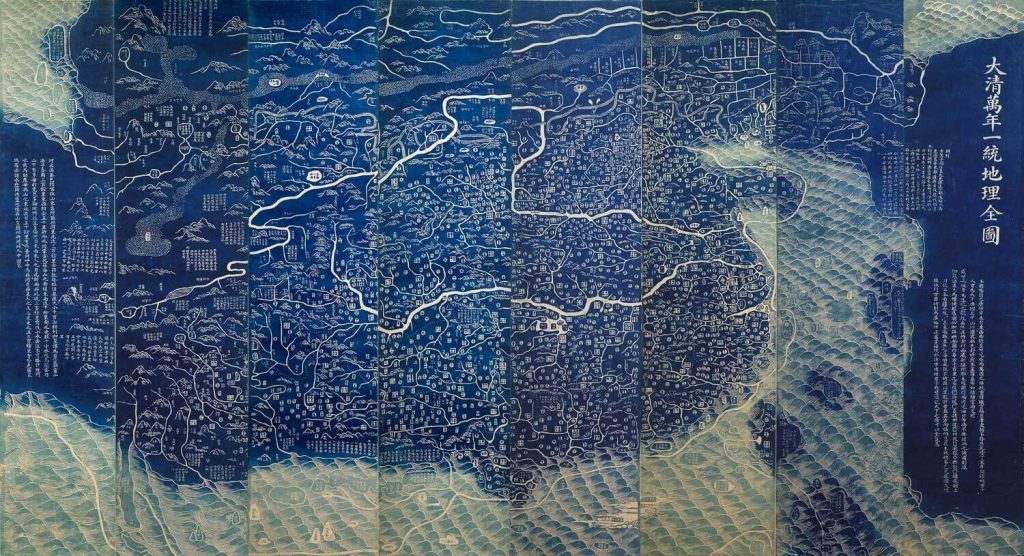
The Blue Map of the World, China (1811). Courtesy of Daniel Crouch Rare Books, London.
Though many dealers hadn’t made sales on the two preview days, they noted that TEFAF tends to be more of a slow burn, with collectors often pulling the trigger on Saturday. Buyers also have more time to make purchase decisions—unlike most fairs, which only run four or five days, TEFAF is over a week long, running through March 19.
“We rarely sell on the first day,” Daniel Crouch of London’s Daniel Crouch Rare Books told Artnet News on Thursday, while noting that he was already fielding plenty of interest for works like the Blue Map of the World, a stunning seven-foot-wide print of a map of China from 1811 priced at over €500,000 ($529,000).
But some sales did come quickly.
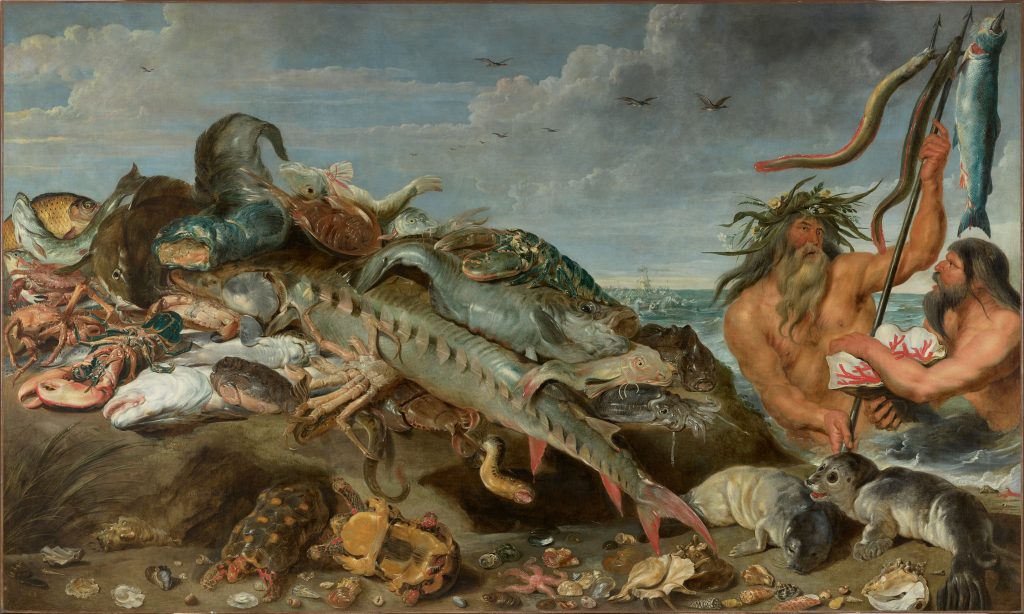
Paul de Vos, The Triumph of Neptune With the Fruits of the Sea (1637). Courtesy of Salomon Lilian, Amsterdam and Geneva.
“It feels like before COVID,” Wendela Burgemeister of the Amsterdam and Geneva gallery Salomon Lilian told Artnet News. She wouldn’t share prices, but pointed to five Old Master paintings, all in a row, that had all sold.
The booth’s centerpiece, a monumental Paul de Vos canvas titled The Triumph of Neptune With the Fruits of the Sea, was also on hold—and as of the fair’s second morning, they had finally established a complete provenance for the 1637 work, thanks to a curator who had heard about the painting and emailed identifying its first owner, the Marques de Leganés.
“This year is great for us—a lot of new contacts, including museums,” Serena Evangelisti, an assistant Antonacci Lapiccirella Fine Art in Rome, told Artnet News. The gallery, which had sold a quartet of portraits by Italian Futurist Giacomo Balla called “The Four Seasons,” had two works on reserve with American museums.
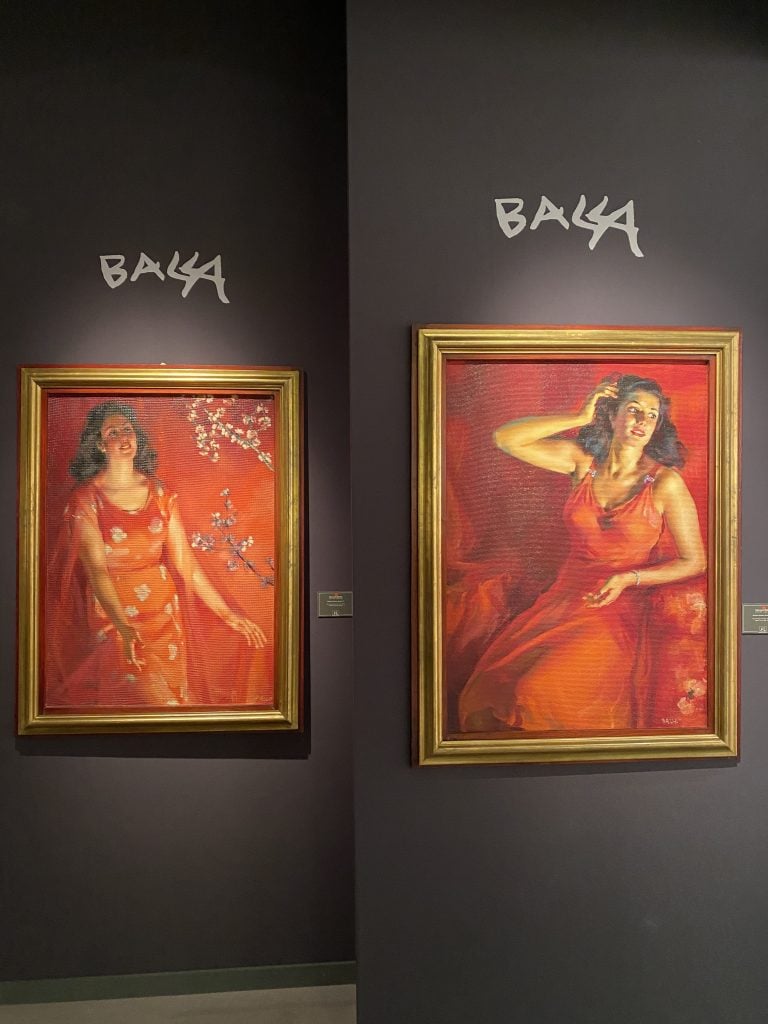
Two of Giacomo Balla’s “The Four Seasons” paintings from Antonacci Lapiccirella Fine Art in Rome at TEFAF Maastricht. Photo by Sarah Cascone.
There was also a noticeable glut of sales in the fair’s showcase section for young and emerging dealers.
“It’s been a very good day, both with museums and private collectors, European and American,” Miriam di Penta of Rome’s Miriam di Penta Fine Art told Artnet News near the end of day one.
The booth, mostly of Old Master paintings, was littered with red dots. The Art Institute of Chicago was among the buyers, snapping up the drawing Pornographic Fantasy by Henry Fuseli (1741–1825). The canvas is part of a body of work in which the Swiss artist (recently the subject of a solo show at the Courtauld in London) depicted “orgiastic couples,” Di Penta said. “His wife is here and he’s making love to this other fantasy figure who is looking at herself in the mirror. It’s very sexy, and it’s very modern to see this in the 18th century.”
The wunderkammer-style booth of first time TEFAF exhibitors Zebregs and Röell, which has locations in Maastricht and Amsterdam, had seen similar success, including the sale of a set of three tortoiseshell combs to a U.S. museum for €95,000 ($100.6 million). Made by British settlers in Jamaica around 1670, the combs tell a complex story of colonialism.
“These embody the depletion of nature, and they’re paid for by money made from enslaving people, but it’s a native engraving technique on a traditional British comb form,” co-owner Dickie Zebregs told Artnet News. “They are a poignant expression of colonial history, but they’re beautiful.”
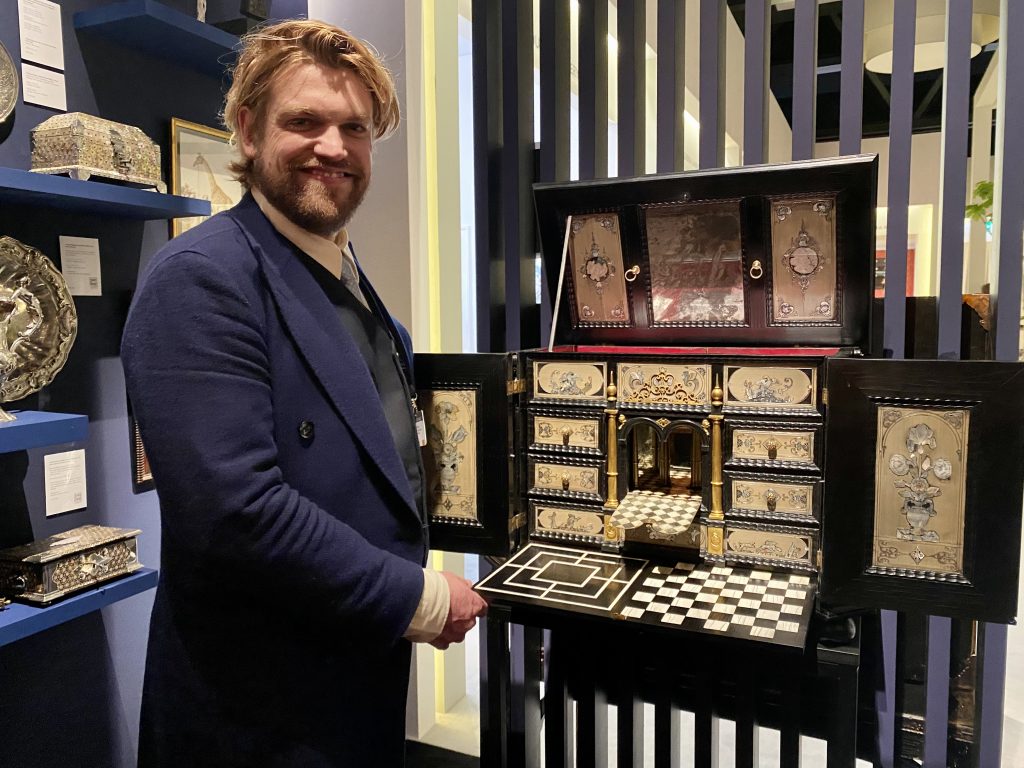
Dickie Zebregs at TEFAF Maastricht with a Dutch cabinet. Photo by Sarah Cascone.
He’d also found a new home for an elaborate mother of pearl inlaid cabinet, full of secret compartments, from the circle of 17th-century Dutch cabinet maker Herman Doomer, for €295,000 ($312,000). The cabinet is similar to ones by Doomer in the collection of New York’s Metropolitan Museum of Art and Amsterdam’s Rijksmuseum, but is unusual in its use of whale baleen, not normally used as a precious material.
Where the Old Master market may be slumping, Zebregs believes there is growing interest in antique art and objects that tell stories that help explain our shared history.
The road to the fair was not an easy one for the gallery, which opened shortly before the pandemic, and its co-owner, who has had to face personal misfortune in the subsequent years. “My house burned down and I had to jump out a third-floor window. I was hospital for six months, but still I’m here, so I’m really proud,” Zebregs said.
Museums were also biting at the booth of London’s Lullo and Pampoulides, where the gallery was in final discussions with three different institutions for paintings including Penitent Magdalene by Luca Giordano (asking price €300,000, or $319,000) and a religious scene by Jacopino Del Conte (asking price in the seven figures).
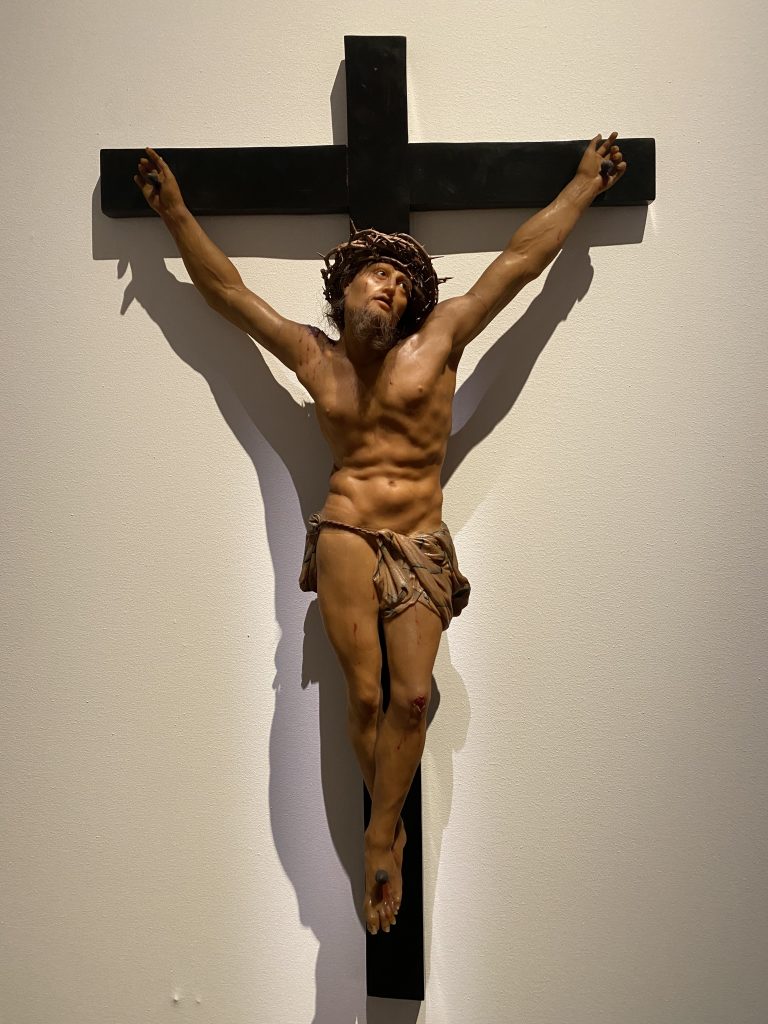
Attributed to Anna Morandi Manzolini, Christ on the Cross (ca. 1760). Photo by Sarah Cascone.
“We priced it in dollars because had a pretty strong feeling it was going to go to an American museum,” the gallery’s Andreas Pampoulides told Artnet News.
Shortly thereafter, Houston Museum of Fine Arts director Gary Tinterow introduced himself to Pampoulides, and told him if the deal with the museum buying an incredibly lifelike wax crucifix fell through, he was interested.
The piece, priced at €250,000 ($260,000), has been attributed to Anna Morandi Manzolini, a 18th-century artist from Bologna known for her anatomical models. This work matches the description of one of her two known religious sculptures, and is so realistic the expected buyer is talking about getting DNA testing on Jesus’s nails and hair to see if they are of human origin.
“There’s a lot of activity,” Pampoulides said of the early sales. “The museums that have come have come prepared, with their directors, with their conservators, with their senior curators. They seem very committed to filling gaps in their collections and telling stories that are relevant to members of the viewing public.”
TEFAF Maastricht is on view at the Maastricht Exhibition and Conference Centre (MECC), Forum 100, 6229 GV Maastricht, Netherlands, from March 9–19, 2023.
More Trending Stories: